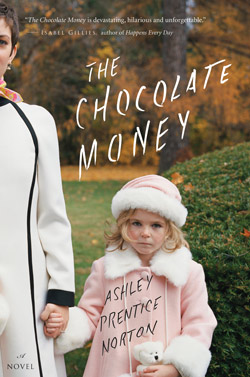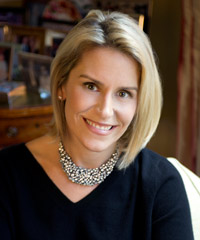 When the Chicago-bred author Ashley Prentice Norton returns this week to promote her new novel, The Chocolate Money (Mariner, $16), out today, she’d be wise to pack an extra coat of armor. Her debut, a dark coming-of-age story about the impressionable daughter of a Mommy Dearest-like chocolate heiress, has tongues wagging in North Shore and Gold Coast social circles because of its resemblance to real people and places. I spoke to the 41-year-old Norton—the daughter of longtime Tribune reporter Jon Anderson and the local philanthropist Abra Prentice Wilkin, and the great-great-granddaughter of John D. Rockefeller—about the book, her prominent family, and returning to her hometown.
When the Chicago-bred author Ashley Prentice Norton returns this week to promote her new novel, The Chocolate Money (Mariner, $16), out today, she’d be wise to pack an extra coat of armor. Her debut, a dark coming-of-age story about the impressionable daughter of a Mommy Dearest-like chocolate heiress, has tongues wagging in North Shore and Gold Coast social circles because of its resemblance to real people and places. I spoke to the 41-year-old Norton—the daughter of longtime Tribune reporter Jon Anderson and the local philanthropist Abra Prentice Wilkin, and the great-great-granddaughter of John D. Rockefeller—about the book, her prominent family, and returning to her hometown.
Let’s get one question out of the way: How closely is the mother in your book, whom you call “Babs,” based on your own mother? Babs has a lot in common with my mom, but I made up a lot of situations. My mom has a very strong voice, and Babs talks a lot like my mom. And Babs does a lot of things that my mom does: She lives in a penthouse, she has these over-the-top parties, she loves having money, and she can be alienating to people with her sort of unorthodox views. But it is fiction. The starting point [for writing it] is our relationship—she’s been such a character in my life; how could [I] not write about it? But it’s not a memoir.
What was your mother’s response when she read an advance of book? She’s very upset about it. She’s not speaking to me currently. We were actually having a good relationship; now it’s up for grabs. To her credit, she’s a journalist, and she was very excited when I sold it. One of the great things about both my parents was that they always encouraged me to write. But we didn’t really talk about what she was doing to do if she didn’t like it. [After she read the advance], she disinvited me to Florida. She said the kids and the nanny were welcome to come, but I was not. She didn’t invite me to her 70th birthday. Her friends are all rallying around her, thinking I’m mean spirited and bitter.
But that wasn’t my intent. I wasn’t thinking that this was going to ruin our relationship, or out her as a terrible mother; it wasn’t intended to have this effect. It isn’t all about her: I made some changes, but I think you also have to take responsibility. There was a lot of material that happened in my childhood that was good fodder, and she has to kind of take responsibility for that.
In the book, for example, Babs sends out a Christmas card with a naked portrait of herself and 10-year-old Bettina. Did that really happen?
That’s true. [My mom] liked to have Christmas cards that people were going to talk about. She said it was very tastefully done.
How old were you and your siblings?
Probably 8, 6, and 4. Or maybe it was 7, 5, and 3. It caused a lot of talk. Probably more than this book.
In many ways, your bio is similar to that of Bettina. You both come from money, attend boarding school, and spend time in France. Like you did, the character even struggles with alcoholism at an early age. How closely does she resemble you?
I went to [the East Coast boarding school] Exeter, and my experience there was much different. There was no Meredith, no sex life [in the book, Bettina has a series of careless romps, often to her detriment]. We were too busy studying for that. I had a lot of friends at Exeter. I wasn’t as aloof. It was hard to fit in because I was a little naïve. I had this big secret—I’m a Rockefeller—but, at Exeter, people with money are a dime a dozen.

Ashley Prentice NortonYou recently wrote an essay for Redbook about your struggles with manic depression and how you contemplated suicide. It was a very brave piece, and very personal. What was your family’s reaction?
As far as my family, they were really excited about it. That was one of the beautiful things of my parents—they encouraged me to take risks. My husband [Alexander Norton, the son of the Chicago antiques dealer Richard Norton] came from a more staid Lake Forest background. He was not that enthused. I explained to him that the reason I wrote the article was not to be sensational, but to take away the stigma of depression because it was such a horrible experience. I thought that if I could help one person—and I’ve gotten all these amazing emails from people telling me I helped them.
Did that essay, in some ways, help you steel yourself for reaction to this book?
Originally, I thought maybe we’d put [the essay] under a pseudonym. But my editor argued that I should use my name. I thought about that, and said OK. I just went for it. And then I thought, I’m going to do my book anyway. I started the book at 23, and it took me 20 years to write. My biggest fear is that people are going to think I sold this because I’m a Rockefeller, and that I’m a one-hit wonder. But I’m not. I see myself as a serious writer. I have an MFA [from New York University]. This is my point of view.
You have three book signings scheduled in Chicago this week (September 20 at 7 pm at the Book Cellar in Lincoln Square, September 21 at 7 pm at the Lake Forest Book Store, and September 24 at 6 pm at the Chicago Public Library main branch). What reactions have you received from your in-laws and other Chicagoans?
My friends in Chicago have been very supportive. My dad is coming to everything, and my husband is flying to Chicago with me. My mother-in-law is making canapés for the reception at Lake Forest Book Store. My mother-in-law and father-in-law both read it. My mother-in-law had issues with the profanity and the sex scenes more than anything. My father-in-law said he was proud of me.
My mom’s not going to be in town, and she’s not coming to any readings. She got a copy and sent it to her friends; they have vilified it. That’s the only bad reaction I’ve had to it. I’m actually going to the Corner Bookstore in New York [the release day], and the Book Cellar before I go to the Lake Forest Book Store. That’s the one I’m nervous about.
Why?
Are people going to show up to be supportive? Are people coming to gawk? I don’t see a lot of people saying, hey, let’s go to a reading on Friday night. It’s my debut—will three people show up?
If you had to hazard a percentage, what amount of the book would you say is true?
It’s hard to quantify. Because when you think about it all being true, everything comes from your subconscious. If I had to say, I’d say 80 percent is fiction, 20 percent is true.
Much of the book takes place in a lavish downtown Chicago apartment—and it sounds very similar to your mother’s legendary penthouse apartment in the Drake.
I totally ripped that off. I told my mom that. It’s such an unusual apartment with a spiral staircase—and the parties. I couldn’t imagine a better apartment.
Photography: (Norton) Stephen Simons



